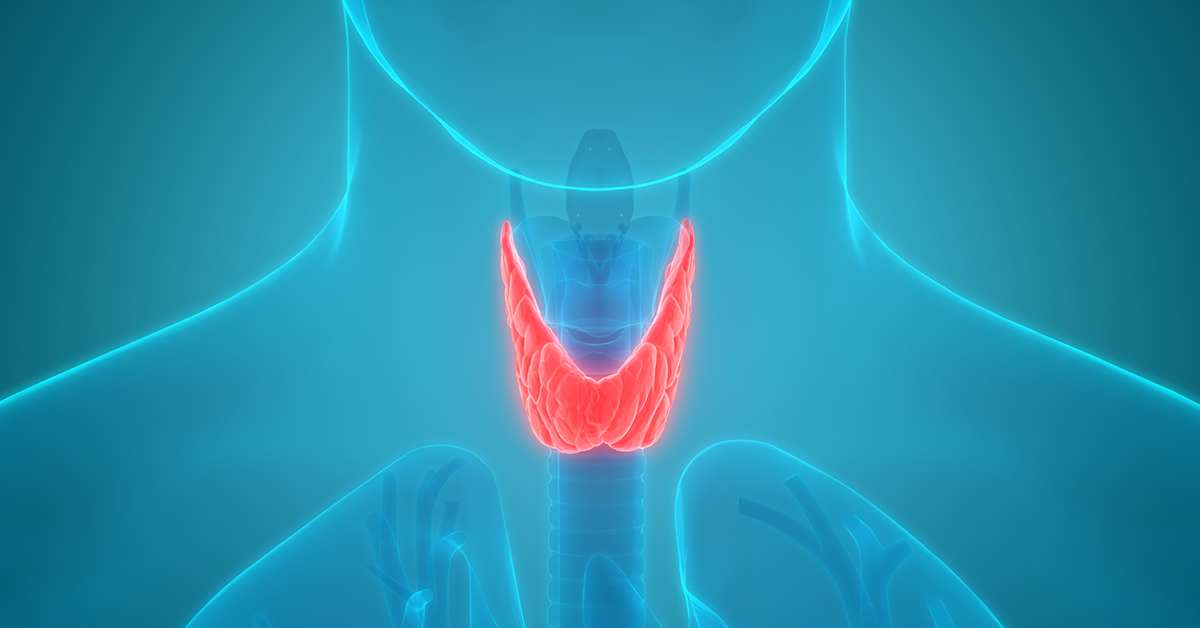
Diagnosing and Treating Thyroid Cancer
-
Thyroid cancer isn’t talked about as often as some other cancers, like breast or colon cancer. But since it’s the most rapidly increasing cancer in the US, it’s important to learn the facts about the disease.
The basics
The thyroid is a butterfly-shaped gland in the neck that makes hormones. Thyroid cancer can affect anyone, but it’s much more likely to occur in women than in men. It also tends to be diagnosed at a younger age compared to many other cancers.
Thyroid cancer often only causes mild symptoms that can easily be blamed on noncancerous conditions. It may be found while a doctor is doing a routine check of a patient’s neck and feels a lump, or it may be accidently discovered during tests conducted for other health reasons.
If someone does have symptoms, they may experience:
- Neck swelling or pain in the front of their neck
- Hoarseness or voice changes that don’t go away
- Trouble breathing or swallowing
- A cough that won’t go away
It’s important to tell your doctor right away if you have any of these symptoms
Detecting thyroid cancer
To determine if someone has thyroid cancer, doctors use one or more of these diagnostic tests:
Scans. An imaging test like a neck ultrasound is usually the first step. Ultrasounds can often show whether a thyroid nodule is solid or fluid-filled. That’s important, since solid nodules are more likely to be cancerous. An ultrasound can also tell if thyroid cancer may have spread to the lymph nodes.
Biopsy. If an ultrasound suggests cancer, a biopsy is needed to confirm the diagnosis. Most thyroid cancers are diagnosed with a needle biopsy in which a thin needle is inserted into a thyroid nodule to remove cells and fluid for lab testing.
Patients should have their needle biopsy performed at an NCI-dedicated Comprehensive Cancer Center. Major cancer treatment centers, like Fox Chase Cancer Center, have doctors who are more experienced at interpreting needle biopsy and imaging results—so they’re better equipped to make an accurate diagnosis.
And, because of the multidisciplinary nature of treatment at Fox Chase, doctors coordinate care, so that patients can come their appointment and receive a needle biopsy at the same place. This reduces wait time and the nerves that can come with waiting for a test result.
Molecular tumor testing. These laboratory tests can uncover specific genes, proteins, and other characteristics of a thyroid tumor. The tests can help doctors determine treatment options, especially when the results of a needle biopsy aren’t clear. Molecular testing is available at Fox Chase, and it helps many thyroid patients avoid unnecessary surgery.
Treating thyroid cancer
Treatment for thyroid cancer is individualized and depends on things like cancer stage and type, as well as the patient’s age, health history, and personal goals.
When you undergo treatment at a cancer center like Fox Chase, your care team will look at all of these factors to put together a personalized treatment plan that may include:
- Surgery to remove part or all of the thyroid
- Hormone therapy, which can inhibit the growth of thyroid cancer cells
- Radioactive iodine therapy or radiation therapy, which can destroy thyroid cancer cells
- Systemic therapies
- Enrollment in a clinical trial
Turn to experts
Overall survival rates for thyroid cancer are high. But some forms of the disease are more aggressive than others. And that’s why if you or a loved one are diagnosed with thyroid cancer, you should turn to experts experienced in treating all forms of the disease.
At Fox Chase, a multidisciplinary team of thyroid experts will work closely to accurately diagnose your thyroid cancer and help you understand your treatment options.
